There’s no shortage of commercial silver cleaning products on the market these days. Those that I’ve tested generally do the job, but they’re messy, contain harsh chemicals, and if that’s not bad enough—they’re expensive! Good news. I have a simple homemade silver cleaner recipe for your lovely silver pieces—chains, earrings, bracelets, flatware, and heirlooms that’s cheaper, better, and definitely faster.
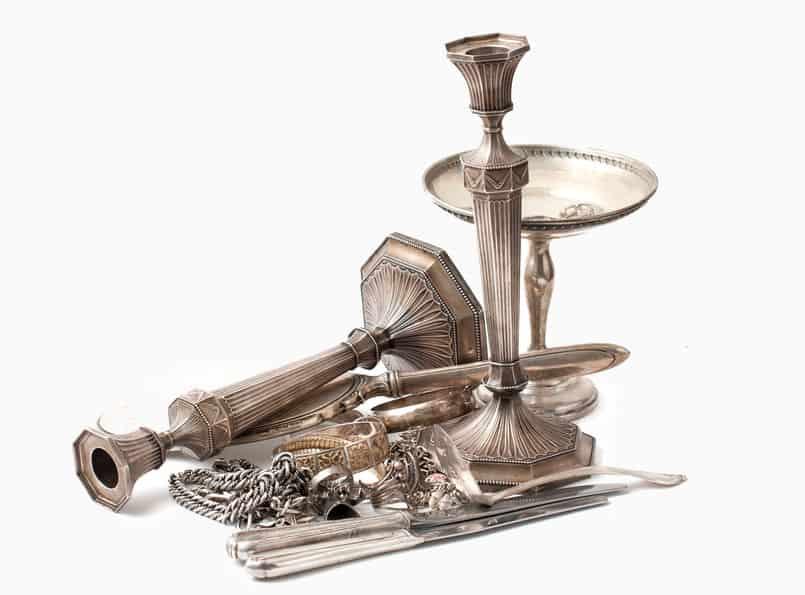
A word of caution: I cannot recommend this method for cleaning jewelry adorned with gemstones or silver items with patina intended to be part of the intricate design. And this definitely is not not for non-silver costume jewelry. What follows is for cleaning silver.
Most important ingredient
There are lots of DIY recipes out there for cleaning silver. I’ve tried many, and the results have ranged from marginal to OK, but not great. One included a final step of scrubbing the items with a green Scotchbrite pad. No! Trust me, I did not need to test that because I know that a green Scotchbrite scrubber will scratch the heck out of silver (stainless steel, too!).
That being said, never forget that the most important ingredient in any DIY method is common sense. With that, let me tell you about the absolute best homemade method and recipe I’ve found—this works like magic!
Equipment
- plastic or glass container
- aluminum foil
- microfiber cloth
Ingredients
- 2 tablespoons washing soda (aka soda ash)
- 2 tablespoons ordinary table salt
- 1 cup vinegar
- 2 cups boiling water
Instructions
- Line the plastic bowl, baking dish, or another similar non-metal container with aluminum foil—shiny side up.
- Add the washing soda and table salt.
- Pour in the vinegar, stir to mix.
- Carefully add the boiling water.
- Drop in silver items to be cleaned, making sure each one is completely covered and in full contact with the aluminum foil.
- After a few minutes—or as long as it takes—when it appears the tarnish has mostly disappeared, carefully remove items with kitchen tongs.
- Gently polish and shine with a microfiber cloth.
This recipe multiplies well for larger items. You may need to use a bucket or similarly larger vessel to ensure the items are completely immersed. And make sure it is well lined with aluminum foil. Do the math to multiply the ingredients.
What’s the magic here?
I’m no scientist, but my research reveals that when the tarnish on silver meets up with sodium carbonate, sodium chloride, and acetic acid and is then introduced to aluminum, an electrochemical reaction occurs. Not to get too technical or to appear that I might be a chemist, I am told that reaction can be expressed as 3Ag2S+2Al—>6Ag+Al2S3as. Impressed?
Sulfur-containing substances in the air cause tarnish. As that tarnish is released, it produces an odor similar to rotten eggs. You’re going to smell this the moment you drop the silver pieces into the solution (it goes away quickly). Hot water accelerates the reaction. I am convinced by what I’ve learned that contrary to what some might believe, this reaction does NO HARM to silver.
And now, for some images taken by me, your highly unskilled photographer.
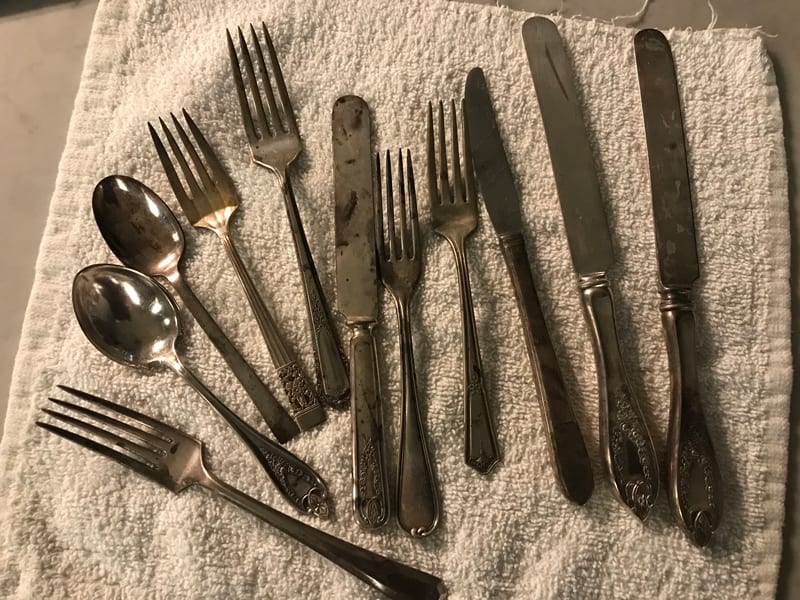
A random selection of silver flatware, highly tarnished from years of non-use and neglect.
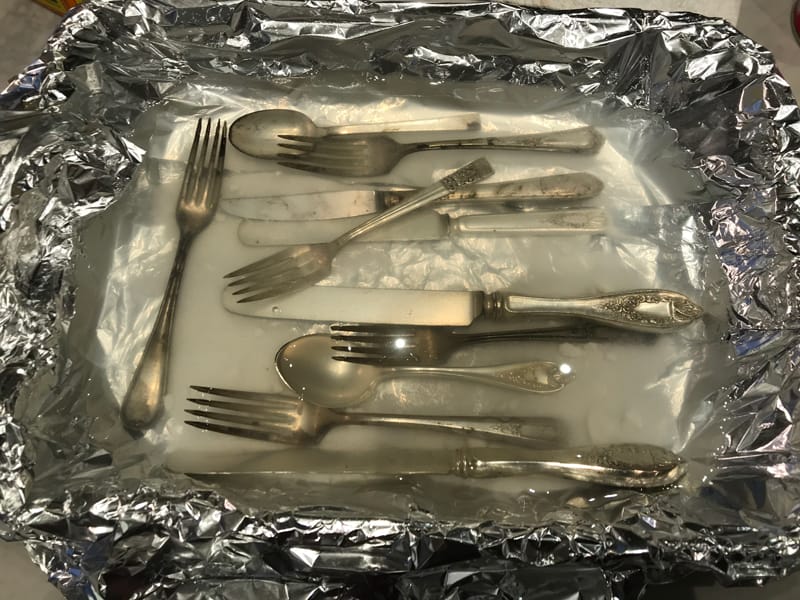
Into the bath they go. Immediately the cleaning solution turns cloudy and gives off a pretty pungent odor, not unlike rotten eggs!
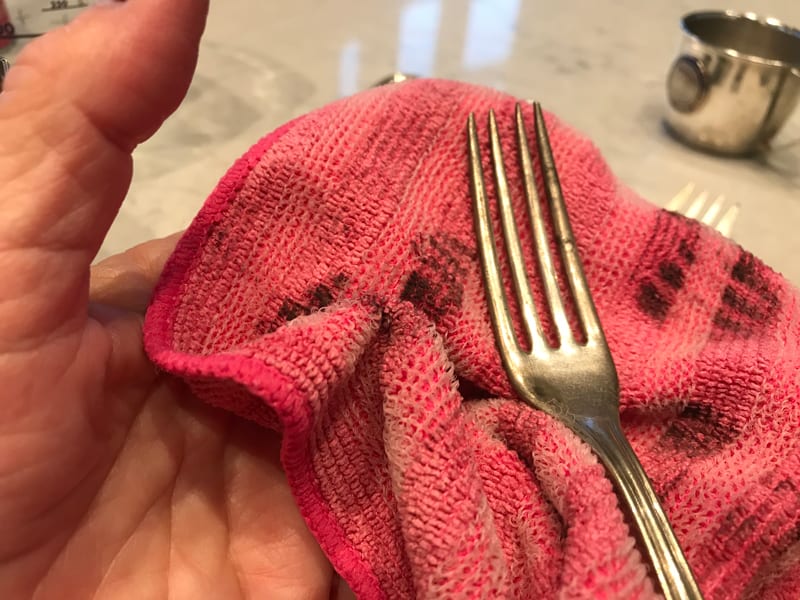
This fork, covered in decades of tarnish build-up, came out not quite as sparkly as the others. A good wiping down with a microfiber cloth was all it needed.
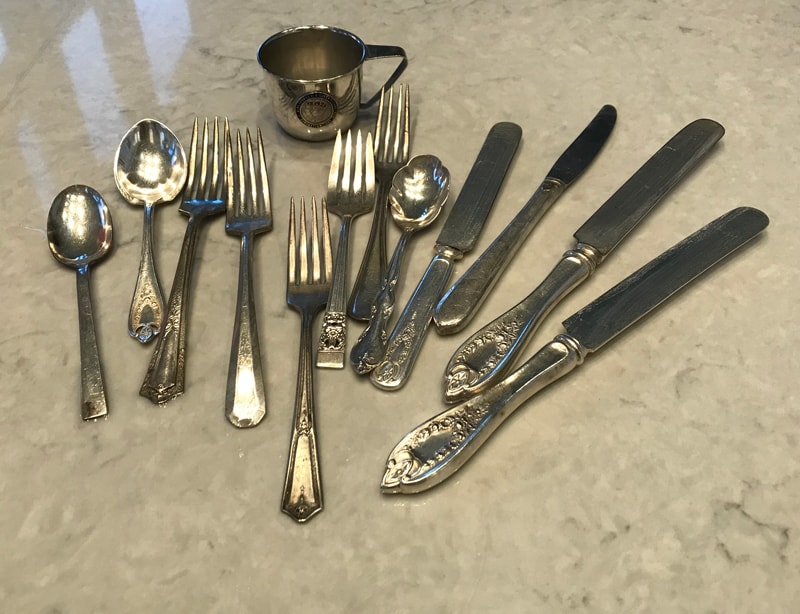
I left these pieces in the “bath” for about 15 minutes, rinsed, and then wiped them dry. So easy and such great results.
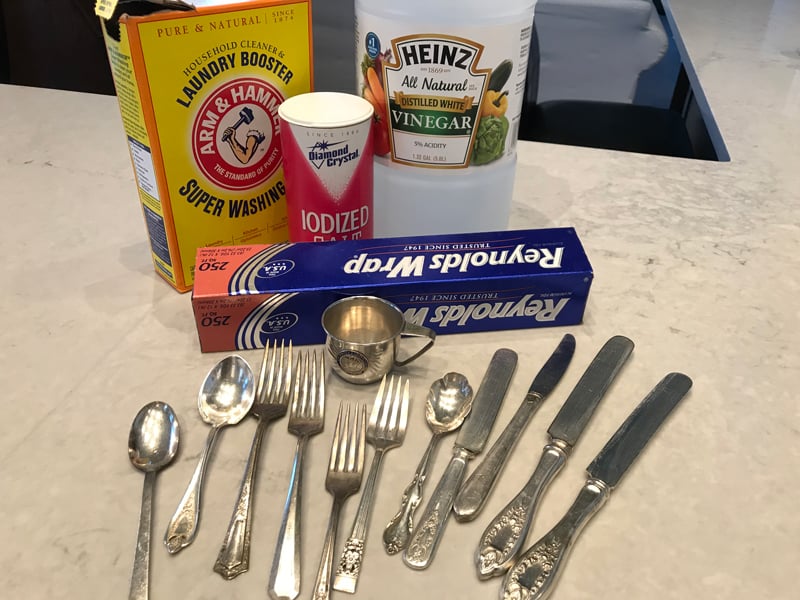
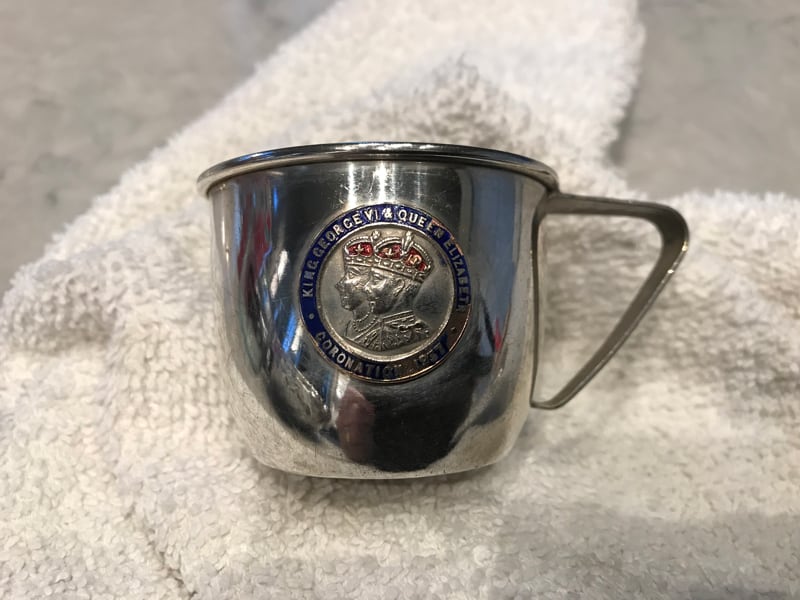
I inherited this tiny silver child’s cup from my dear Scottish mother-in-law, a wholly devoted lover and collector of all things British Royal Family. She purchased this commemorative piece upon the coronation of George VI and his wife Elizabeth as king and queen of the United Kingdom and the Dominions of the British Commonwealth, which took place at Westminster Abbey, London, on May 12, 1937. It was black as night (sorry, Mom) before I tucked it into the bath along with the flatware. Such a precious treasure, now bright and shiny!
Best Commercial Product
Realizing not all silver items will fit in a bucket or bowl, and for those who prefer to buy rather than DIY, there are times you may need to use a commercial silver cleaning product. In that case, I highly recommend the metal polishing cream, Simichrome Metal Polish. It, together with your elbow grease, will do a great job on silver.
Simichrome does a beautiful job of removing surface rust from chrome, polishing aluminum until it looks new, even sprucing up delicate, heirloom family silver. And it won’t leave scratches or abrasive marks. In as little as 30 seconds, you can watch a small, faded item goes from dull, oxidized metal to a having a perfect mirror finish.
In addition to restoring the original luster, Simichrome also leaves an invisible, protective coating to prevent further tarnishing and help keep the shine much longer. A solid favorite for home, industry, auto, motorcycle, and antique users, Simichrome is the fastest, most effective metal polishing and cleaning agent in the industry today.
Simichrome is the least harsh commercial product I know of but also the most effective. This is what serious car enthusiasts use to polish the chrome and silver on engines. Collectors use it on their most highly-prized collectibles.
While Simichrome will also clean coins back to mint-condition, please do your own research to discover if bringing them back to like-new appearance will destroy their value. Remember the patina!
Everyday Cheapskate participates in the Amazon Services LLC Associates Program, an affiliate advertising program designed to provide a means for us to earn from qualifying purchases, at no cost to you.
More from Everyday Cheapskate
Please keep your comments positive, encouraging, helpful, brief, and on-topic in keeping with EC Commenting Guidelines
Caught yourself reading all the way ’til the end? Why not share with a friend.
Source: https://gardencourte.com
Categories: Recipe

